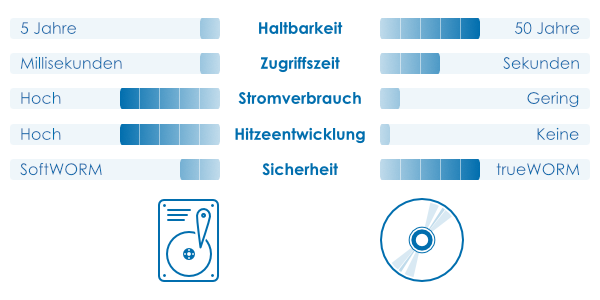Hard disks are inexpensive, and contrary to all predictions, their capacity is still growing steadily and they offer reliable and fast access to the information stored on them. They are actually less suitable for archiving, their average lifetime in continuous operation is limited to only a few years and last but not least, due to the changeability of the information stored on them, they are not really compliant, i.e. they are not compliant with the legal requirements for archiving.
FAST LTA, NetApp, EMC and many other manufacturers of hard disk-based storage systems circumvent this problem and create either via software (SoftWORM) or processors on a special hard disk controller an artificial WORM system (Write Once Read Many), which distributes the data evenly across the connected hard disks. Against the failure of hard disks, the hard disks are operated in a RAID group with partially several spare disks, so that the systems can reconstruct the file system themselves in case of a failure. However, if the controller fails, a serious problem arises because the encryption algorithm is stored on it, without which the data distributed on the hard disks cannot even be read.
Since in many hard disk archive systems, software alone decides whether the data is unchangeable or not, these solutions are not immune to Trojans or malware, which then take the valuable information hostage.
Another not insignificant point is the power consumption, which in the case of permanently spinning disks is also significant due to the heat generated, which must be expensively cooled down again via the air conditioning systems in the data center. Some manufacturers are now using desktop hard disks instead of server hard disks, as this firmware is easier to switch on and off and thus achieves a better energy balance - but by using inferior hard disks compared to the 24/7 server hard disks.
